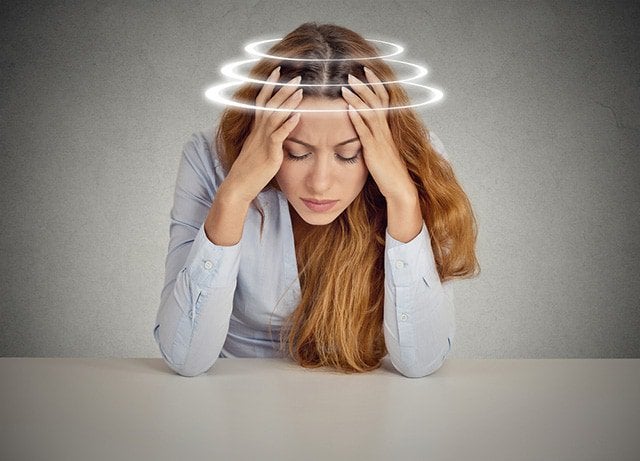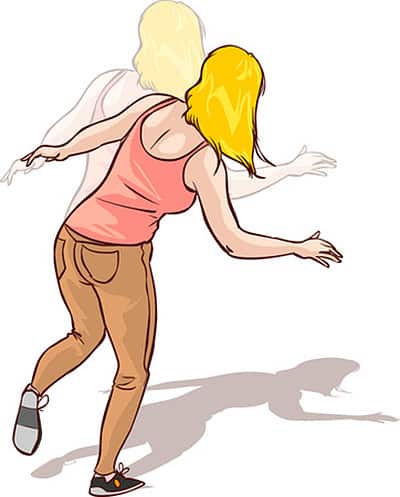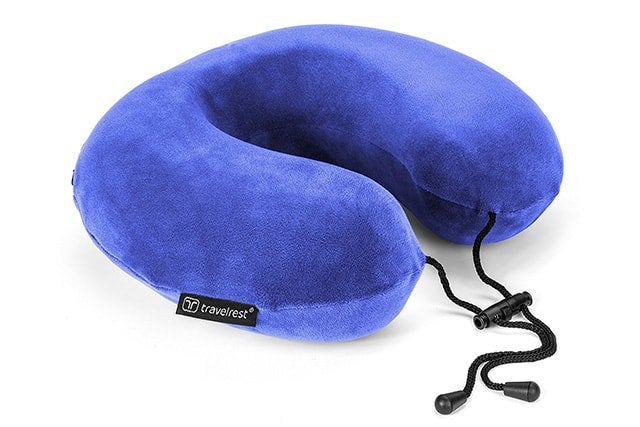Dealing with vertigo isn’t an easy thing. It can cause problems in your daily life by making you uncomfortable in otherwise normal situations. The last thing you want is to have your sleep exacerbate your condition or to have your condition interrupt your sleep.
In order to really figure out how sleep and vertigo are linked, we need to have a better understanding of the causes of vertigo and ask, “what is vertigo?” You may be experiencing symptoms of vertigo and not realize that’s what it is. It’s an interesting condition… and not just the name of an Alfred Hitchcock film.
What is Vertigo?
If you’ve ever been walking along, minding your own business and suddenly felt dizzy, that’s what vertigo feels like. It’s like having a dizzy spell; everything starts to feel like it’s spinning. Sometimes it might feel like you’re being spun, other times it may feel like the world around you has broken free from its axis. Either way, it’s not a very fun feeling.
What Causes Vertigo?
Vertigo has a few different causes. Primarily, vertigo is caused by an issue with the inner ear. Sometimes it can be an infection, other times it’s something a little more serious. Since your inner ear is what helps control your balance and such, anything going wrong in there can make you feel symptoms of vertigo.
BPPV, or benign paroxysmal positional vertigo, is a condition caused when small calcium particles, called canaliths or ear rocks, develop in the canals of your inner ear. Obviously, since we know the inner ear controls balance, this isn’t a good thing. Some sort of foreign object in your ear is going to make you feel off balance. The cause of BPPV isn’t completely known, but it seems to be connected to age.
Another potential cause of vertigo is something called Meniere’s disease. Much like BBPV, it is an inner ear disorder. It is believed that with Meniere’s disease, fluid builds up in the inner ears and causes pressure changes, leading to vertigo, along with other issues such as tinnitus and hearing loss. For clarification purposes, tinnitus is a ringing in the ears.
Yet another possible cause of vertigo is vestibular neuritis or labyrinthitis. Though the name is kind of cool, the condition is not. This is typically caused by an infection of some sort, usually a viral one, at that. The infection can cause some inflammation around the nerves in the inner ear, again throwing off that all-important equilibrium.
Some other potential causes, though not quite as common, are head or neck injury, brain problems such as a stroke, medications which can cause ear damage, and migraine headaches.
You may want to read: Tinnitus Sound Machines Reviews for Sleeping
Symptoms
Vertigo is fairly easy to recognize, but it can also bring some other symptoms along with it. Vertigo typically involves a feeling of spinning or tilting. Like you’re unable to keep your balance. You may find yourself swaying and such, or even sort of pulling to the left or the right, unable to straighten yourself out. It’s something which can feel more than a little disconcerting.
Along with the feelings of losing balance, vertigo sometimes comes along with other less-savory feelings. Feelings of nausea or vomiting can happen, as well as strange, jerky movements of the eye. Sometimes you might also experience a headache, as well as tinnitus and sweating.
If you’ve ever passed out, those additional symptoms can feel similar to the sensations your body goes through before losing consciousness.
Is It Really Vertigo?
There are quite a few different conditions which can lead to you feeling dizziness and difficulty sleeping, so how can you be sure what you’re experiencing is vertigo? Anemia, diabetes, panic attacks, heart issues and even too much caffeine can all lead to sensations which could feel like vertigo.
One thing is certain, if you are constantly finding yourself feeling dizzy, you should see a medical expert. Not only can they properly diagnose what’s happening, they might save your life if it’s something far more serious than something like vertigo.
When Should I See a Doctor?
If you’re experiencing mild vertigo, you’re probably safe making a regular appointment to see your family physician. Even if it’s mild, this is something you should do. In some situations, however, a trip to the emergency room could be in order.
A sudden onset of multiple vertigo symptoms, double vision, a feeling of weakness, trouble speaking, strange eye movements, odd behaviors and difficulty moving can be signs of something much more serious, such as a stroke, and shouldn’t be taken lightly. If you’re experiencing any of these types of symptoms, hightail it to the emergency room, as your life may depend on it.
What Vertigo Isn’t
For many years, vertigo was associated with acrophobia, the fear of heights. This is, as I’m sure you have figured out by now, incorrect. It’s where the Hitchcock film Vertigo got its name. Perhaps that’s why it didn’t do so well when it released in 1965. Vertigo can, however, be set off by looking down from a great height in a condition called “height vertigo.”
Additionally, it isn’t correct to call any sort of dizzy spell “vertigo.” It’s not unusual to hear someone say they’re experiencing vertigo when they’re just feeling a bit dizzy, but they would be wrong. Vertigo has some pretty specific characteristics.
Treatments
Other than “What’s happening to me?” I’m pretty sure the first question any vertigo sufferer will ask is “How do I fix it?” In a great many cases, vertigo will actually go away on its own. This is especially true in cases which are caused by infections and such. Fix the infection, fix the vertigo.
However, we’re also very adaptive creatures. Not only can we adapt to different environments and such, our body can adapt to issues it is experiencing. Changes in the inner ear are one of those things, though it may not be a perfect science. Your body can adjust and begin to rely on other senses to maintain your balance. There are, however, treatments for more extreme cases.
Vestibular Rehabilitation
Since part of the system which gets a little wonky and causes vertigo is the vestibular system, one can undergo vestibular rehabilitation. It’s a sort of physical therapy which can help speed up the natural process of your body adjusting to vertigo. The process is intended to help train your other senses to compensate for whatever issues you may be having in order to stop any recurring vertigo sensations.
Canalith Repositioning Maneuvers
For BPPV sufferers, the American Academy of Neurology has some guidelines for helping get rid of the calcium deposits which can build up in the inner ear and cause vertigo. A series of head movements can shift the deposits out of the ear canal and into the chamber of the inner ear where they can be absorbed.
The process itself can cause a fair bit of vertigo, but if it fixes the issue, it may be worth the temporary discomfort. If this is something you’re interested in, a doctor or a physical therapist can give you a hand and guide you through what needs to be done. The process is safe and quite effective. There are several of these, but the method most often used is called the Epley Maneuver.
Medication
Though medication can’t completely cure some forms of vertigo, it can definitely help with the kinds caused by an infection. Antibiotics or steroids can be prescribed in an effort to reduce the irritation and swelling which may be causing the problem.
Additionally, the symptoms felt by Meniere’s disease can also be tempered a bit using a diuretic to help reduce the fluid buildup. Reduced fluid means reduced pressure which should help with the inner ear issues which may have caused the vertigo.
Aside from the vertigo itself, many types of medication can help with some of the additional symptoms of vertigo like nausea and motion sickness.
Surgery
Since vertigo can also be caused by pressure from more serious sources, like tumors or injuries to the body, surgery is sometimes necessary. If a tumor is putting pressure in an area which causes vertigo, it would be necessary to go in and remove it if you want to stop the symptoms from continuing.
How Long Does it Last?
How long vertigo lasts is entirely dependent on what the cause is. If you’re suffering from BPPV and you do the special head movements, you can usually find symptoms will go away in about a week. If it’s caused by inflammation, then it’s likely not going to be fixed until you get that issue fixed.
Vertigo caused by stroke can actually be permanent if brain damage has occurred. The same can be said for vertigo caused by head or neck injuries.
Are Sleep Apnea and Vertigo Related?
Yes, sort of. While there have been several studies done, none of them are completely conclusive, but they do show a possible link between the two. It seems the consensus isn’t necessarily that having sleep apnea causes vertigo, but that the lack of sleep one experiences due to suffering from sleep apnea can exacerbate the symptoms associated with vertigo.
When you’re tired, you become overly sensitive to a great many things, including lights and sounds and such. If you’re suffering from inner ear issues, this is no exception. You are quite likely to experience more intense issues than you would if you were getting a decent night’s sleep. For these reasons, sleep tips for vertigo are pretty important.
Sleep Tips for Vertigo
Since vertigo is mostly caused by issues with your ears, it would make sense that how you sleep can have an effect on how badly your vertigo acts up. There are certain things you can do, both in your sleeping habits, including positioning and head placement, and in how you handle things before bed, which can help make sure you’re able to sleep through the night.
Getting a good night’s sleep is going to be your first and greatest goal if you want to keep your vertigo under control. As we discussed in the sleep apnea section, getting a poor night’s sleep can lead to real issues with vertigo throughout the next day. The more tired you are, the more sensitive you are to external and internal issues.
If you didn’t get enough sleep you could find that you’re far more susceptible to a bout of vertigo and car sickness while driving to work in the morning. If you’re too tired, you can easily find yourself stumbling or losing balance if somebody calls your name and you turn your head too quickly.
If you’ve ever woken up in the middle of the night and felt an intense dizziness, then you may have an idea of what waking up with vertigo feels like, because that’s pretty much what it is.
You may be interested in: Why Am I Waking Up at Night?
Tips Before Bed
Some of these “before bed” tips are going to feel a little obvious. When it’s starting to get closer to bedtime, it’s time to cut some things out. Don’t drink caffeine in the evening. Avoid spicy foods for dinner. Don’t look at your phone when you’re in bed.
The caffeine should be obvious, but spicy foods may not be. There are few things worse than waking up in the middle of the night because of an acid buildup. If you’re going the spicy route, be sure to take some sort of antacid. Waking up with heartburn and then having a vertigo attack would not be a very good combination.
Not looking at your phone could be a bit tough. A great many of us end the day by relaxing in bed and checking out what’s happening in the world on our mobile devices. Or perhaps playing a game or watching an episode of something or other. This, unfortunately, is not conducive to a good night of sleep.
The flashing lights and bright images can help to keep your brain active instead of slowing it down. If you want to relax, try a book. The words on pages are far less harsh to your eyes, and the act of reading is calming, in and of itself.Z
Many sleep experts recommend not doing anything at all in your bedroom save for sleep and sex. By using it for only these purposes, your body will not associate it with anything else, so when you lie down for the night it knows one of two things are going to happen, rather than it thinking it’s time to read or watch TV for a while.
If you find yourself having trouble falling asleep, consider making your bedroom just that. It’s easier said than done, especially in this day and age, but it’s important if you want to make sure you’re getting enough rest to keep yourself feeling well for the next day.
Sleeping Position
Your sleeping position can have a pretty serious effect on feelings of vertigo. If you’re suffering from BPPV, which is sometimes called top shelf vertigo, lying in such a way which can cause the calcified materials in your ear to shift can be a big issue. You can very easily find yourself jerking awake in the middle of the night and feeling like the world around you has come unhinged.
Figuring out what’s going to work best for you, however, may take a couple nights of discomfort. There’s definitely some trial and error involved, particularly in the case of BPPV. If you’ve not been taught the correct movements, more specifically the Epley and Semont Maneuvers, figuring out the right position sort of comes down to not laying on your bad side.
Sleeping at an incline also helps, but I’ll leave that for our next section.
If your issue isn’t BPPV, then you’re going to just want to make sure you’re not sleeping in such a way that you’re putting pressure on whichever area is experiencing the inflammation or irritation. Since changes to the inner ear can throw off your equilibrium and cause you to experience vertigo, doing anything you can to not apply additional strain to it is a good idea.
In truth, there isn’t really a “best” sleeping position for vertigo, but there is going to be one that works best for you, you’ll just need to take a little time to figure out what it is.
Once you’ve figured it out, however, keeping yourself in that position doesn’t have to be especially tricky. If you need to sleep on one side, for instance, make it difficult for you to roll over. This can be done by placing pillows or a bunched-up blanket behind you. If it’s difficult to roll over in your sleep, you’re less likely to do so.
Pillows and Head Placement
Only using one pillow? You may want to consider adding a second. Kicking your head up to an incline is a great way to make sure the calcified particles which have developed due to BPPV don’t fall into a position which can give you problems. This can also assist if you’re dealing with some sort of infection.
If you have an ear infection which is causing you to develop fluid in your inner ear, adjusting the angle of your head can help keep the liquid from pooling in areas which can cause vertigo. For this purpose, a wedge pillow might be the best pillow for vertigo sufferers.
Head Positioning for Vertigo
Head positioning and placement go hand in hand. Yes, you want your head elevated, but how should you set yourself up once your head is in the air? Do you roll it over to a certain side? Do you attempt to keep it straight all night?
What you don’t want to do is sleep with your bad ear down. A study was done in 2012 which found that sleeping with your head at a 45 degree angle with the bad ear down can straight up cause you to suffer BPPV vertigo.
Interestingly, the study also found that people in whom BPPV had been recurring were more likely to naturally move to sleeping on their bad ear. This can be combatted by using the right equipment (pillows and such) and making sure you start in a proper position when you first go to bed.
Poor head position combined with other factors, such as BPPV or labyrinthitis, are what causes dizziness while sleeping. If you don’t take into consideration your condition when you go to sleep, you stand a fair chance of having a pretty rude awakening.
Types of Pillows for Vertigo
The best pillows for vertigo sufferers are going to be any which provide for a decent head angle. In truth, most any pillow work, but a wedge pillow is probably going to be your best bet. In some ways, it’s almost like having your own positional vertigo pillow, letting you adjust your angle while providing support for both your head and your neck.
One of the biggest issues I have with using multiple regular pillows is that my neck gets no support. A wedge pillow can extend from your lower back all the way up to your head, should you so desire, giving you all the support you need to get a good night’s rest.
It’s hard to say what is the best wedge pillow for vertigo, as that is most definitely up to personal taste, but I would recommend one which is going to provide full support to your back and neck so you don’t end up with additional issues as you may when propping your head up in a normal sort of fashion.
Beyond their use for vertigo relief, wedge pillows are pretty handy in general. You can set them into different positions to serve as a back rest while reading before going to sleep, for instance.
In addition to the wedge pillow, there are also pillows out there designed for folks suffering from vertigo. It seems their intent is to somehow naturally replicate the Epley Maneuver and its kin in order to make sure BPPV sufferers wake without any dizzying sensations.
Regular pillows will also work, but you’ll probably need more than one. Whichever route you go, I suggest you get one which will give you a fair amount of support. If you have two soft pillows, you may not see as much of an incline as you would using two firm pillows.
Some people have also found travel pillows to be especially handy. The kind that wrap around your neck can force your head a little higher than it might otherwise be, helping to keep those pesky ear rocks from falling into places you don’t want them.
It might also be wise to invest in a body pillow, something which is large and dense enough to keep you from rolling around in bed. If you’re able to maintain a constant position throughout the night, you’re going to find yourself less likely to wake up feeling dizzy in the morning.
Tips After Waking Up
Once your eyes are finally ready to open in the morning, don’t get up quickly. Don’t jerk your head around too much. Try to move slowly and with intention, making sure you don’t do anything to set off your vertigo. If you pop up in the morning right when you wake, you stand a fair chance of having an absolutely horrible start to your day which could send you reeling.
Your chances of suffering from sensations of vertigo upon waking are most likely in cases of BPPV. Since this form of vertigo is set off by ear rocks shifting within your inner ear, a quick movement of the head can have dire effects. Considering this, it might be a good idea to get a different sort of alarm clock.
Instead of the typical kind which jolts you to waking with loud noises, you may want to try out some of the subtler alarms. There are several kinds which could benefit you. Some will slowly vibrate you to waking, while others will work as a standard alarm, but start quietly and gradually get louder.
In recent years, alarms which use lights are becoming more popular. As the alarm goes off, the unit will begin to emit light which gradually get brighter and brighter. These have been clinically proven to help you wake up more gently, but also more efficiently. It’s almost like a simulated sunrise any time of the day.
I don’t have any personal experience with these, but the concept sounds positively solid. Waking up natural to the sun always makes me feel much better than hearing a harsh alarm clock. Some morning, however, I have to get up before the sun rises, and others still I may have to work late, so sleeping in is necessary.
With a light-style alarm clock, I would be able to keep that sensation of waking up naturally, and that doesn’t sound like it can be a bad thing at all.
Other Sleep Products for Vertigo
Vertigo often comes with some unsavory traveling partners, like nausea and vomiting. Because of this, sometimes remedies for those specific symptoms are necessary. An anti-emetic can be of great use, and some of them also include sleep aids which may help you bypass vertigo sensations by falling asleep more quickly.
Living with Vertigo
As with many chronic conditions, living with vertigo doesn’t mean letting it control your life. Medications, surgical procedures and more can help solve the more intense causes of vertigo, and conditions like BPPV can be fixed on a regular basis using techniques like the Epley Maneuver.
Some changes will have to be made, of course. You’ll need to learn how to handle yourself, and part of that is going to be retraining your body to balance itself using different senses. You may need to keep the possibility of falling in mind and make sure you’re prepared for that by using a cane or some other assistance.
Even dietary changes can help with vertigo. Some things, such as salt, can exacerbate the condition. In general, being healthy can help, so eating right and exercising is a great way to combat issues.
What is likely the most important thing to note, however, is the fact that you are not alone. Vertigo has been around a long time, and people have been figuring out how to deal with it for the whole stretch. There are groups and organizations out there for people who suffer from vertigo in which they can share their stories and what they have found to have helped them. If you’re feeling stressed out because of your condition, consider joining a group like this and getting a little support.
Don’t just keep your condition to yourself, either. Talk about it with your family and friends. Let them know what’s going on with you so that, in the event you may experience vertigo while you’re with them, they are aware of what is happening and can help you. Educating the populace is a great way to make sure you won’t get hurt and they won’t worry too much.
You may want to read: Why Does the Sun Make You Tired?
Wrapping it Up
A vertigo diagnosis doesn’t have to mean your life is over. Yes, it’s quite uncomfortable, but so are a great many things. With the right procedures, medications or whatever is necessary, the condition can very easily come under control, it just takes a little time.
You can help it along with certain techniques and changing your diet and sleeping routines. Sleep, especially, is important. Being well-rested will make you less likely to experience extreme vertigo symptoms, which is a huge plus.
Just to stress it one more time, you’re not the first person to have vertigo. If you’re feeling alone in your condition and as though it’s something you don’t know how to handle, join a support community. Reach out to other sufferers and maybe you’ll find you can help someone else out along the way. One of the best ways to heal is to help heal another.

















